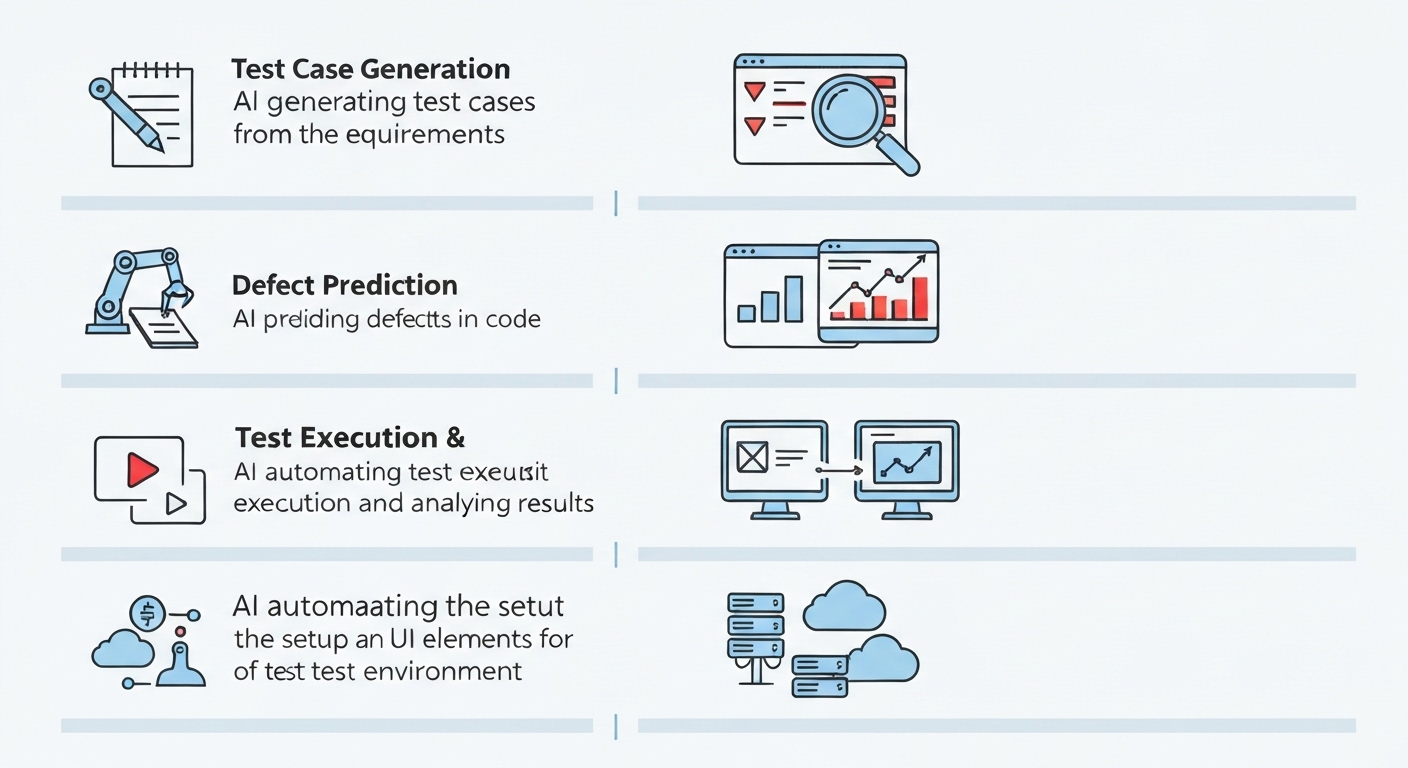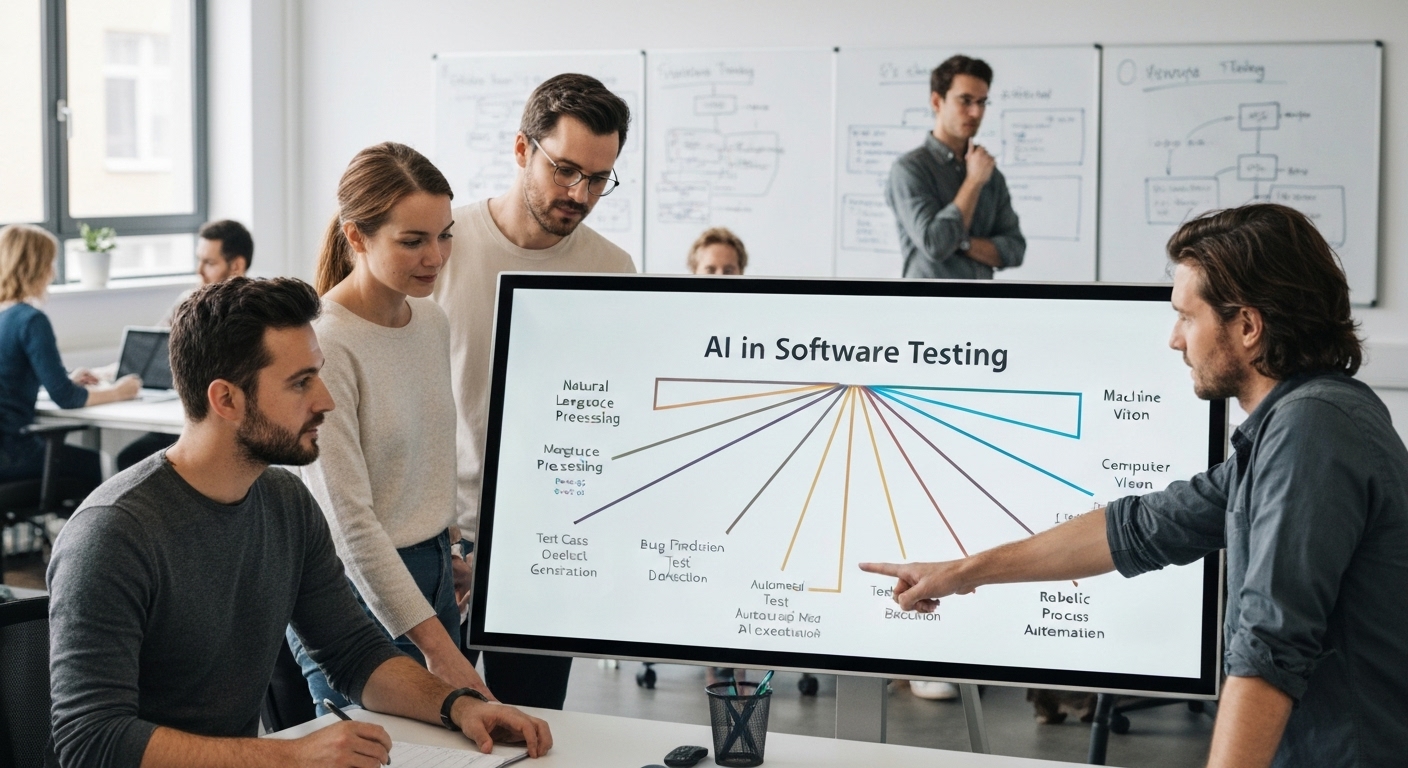Automating Software Testing with AI : A Comprehensive Guide
Automating software testing with ai is transforming the software development lifecycle, enabling faster release cycles and higher quality applications. By leveraging artificial intelligence and machine learning, organizations can optimize their testing processes, reduce manual effort, and improve overall software reliability.

What is AI-Powered Testing?
AI-powered testing, also known as artificial intelligence testing, utilizes machine learning algorithms to automate various aspects of the software testing process. This includes test case generation, test execution, defect prediction, and test environment configuration. The goal is to create a more efficient, reliable, and cost-effective testing process.

Benefits of Automating Software Testing with AI
- Improved Test Coverage: AI can analyze code and user behavior to identify areas that require more testing, leading to better overall coverage.
- Reduced Testing Time: Automated test execution and analysis significantly reduce the time required for testing.
- Early Defect Detection: AI can predict potential defects based on code patterns and historical data, allowing developers to address issues early in the development cycle.
- Enhanced Accuracy: AI-powered tools reduce the risk of human error in test execution and analysis.
- Cost Savings: By automating repetitive tasks and reducing the need for manual testing, organizations can achieve significant cost savings.
These benefits highlight the value of integrating AI into software testing strategies.
Key AI Techniques Used in Software Testing
Several AI techniques are employed in automating software testing. Understanding these techniques is crucial for effectively implementing AI-driven testing solutions.

Machine Learning for Test Automation
Machine learning algorithms can learn from data to automate various testing tasks. For example, machine learning can be used to:
- Generate Test Cases: Train models to generate test cases based on code analysis and user behavior.
- Prioritize Test Cases: Identify the most critical test cases to execute based on risk and impact.
- Predict Defects: Analyze code and historical data to predict potential defects and prioritize areas for testing.
- Automate Test Execution: Use machine learning to automate the execution of test cases and analyze the results.
Natural Language Processing (NLP) in Testing
NLP enables computers to understand and process human language, which can be used to:
- Analyze Requirements: Extract test cases from requirement documents.
- Generate Test Data: Create realistic test data based on descriptions.
- Interpret Test Results: Understand and summarize test results in natural language.
Computer Vision for UI Testing
Computer vision techniques can be used to automate UI testing by:
- Identifying UI Elements: Automatically recognize and interact with UI elements.
- Validating UI Appearance: Ensure that the UI looks as expected across different devices and browsers.
- Automating Visual Testing: Detect visual defects that are not easily detected by traditional testing methods.
Implementing AI in Your Testing Process
Implementing AI in your testing process requires a strategic approach. It’s not just about adopting new tools; it’s about transforming your entire testing culture.
Steps to Integrate AI into Software Testing
- Assess Your Current Testing Process: Identify pain points and areas where AI can provide the most value.
- Choose the Right AI Testing Tools: Select tools that align with your specific needs and technology stack.
- Train Your Team: Provide training on how to use AI-powered testing tools and techniques.
- Start Small and Iterate: Begin with a pilot project and gradually expand AI adoption across your organization.
- Monitor and Optimize: Continuously monitor the performance of AI-powered testing and make adjustments as needed.
Selecting the right ai testing tools is critical for success.
Challenges of Automating Software Testing with AI
While the benefits of automating software testing with ai are significant, there are also challenges to consider:
- Data Requirements: AI algorithms require large amounts of data to train effectively.
- Tool Complexity: AI-powered testing tools can be complex and require specialized expertise.
- Maintenance: AI models need to be continuously maintained and updated to ensure accuracy.
- Integration: Integrating AI into existing testing processes can be challenging.
Addressing these challenges is crucial for realizing the full potential of intelligent test automation.
The Future of AI in Software Testing
The future of AI in software testing is bright. As AI technology continues to evolve, we can expect even more sophisticated and automated testing solutions. This includes advancements in self-healing tests and predictive testing.
Emerging Trends in AI-Driven Testing
- Self-Healing Tests: Tests that automatically adapt to changes in the application.
- Predictive Testing: AI that predicts potential defects before they occur.
- Autonomous Testing: Fully automated testing processes that require minimal human intervention.
These trends will further revolutionize the software testing landscape, leading to higher quality software and faster release cycles. For additional insights, refer to the research by the National Institute of Standards and Technology (NIST) on software testing methodologies, available at nist.gov.
Visit flashs.cloud to discover more about AI-powered solutions that can enhance your testing.
Conclusion
Automating software testing with ai offers significant benefits for organizations looking to improve their software quality assurance processes. By leveraging AI techniques, such as machine learning, NLP, and computer vision, companies can achieve better test coverage, reduced testing time, and early defect detection. While there are challenges to consider, the potential rewards are well worth the effort. As AI technology continues to advance, it will play an increasingly important role in ensuring the quality and reliability of software applications.
HOTLINE
+84372 005 899


